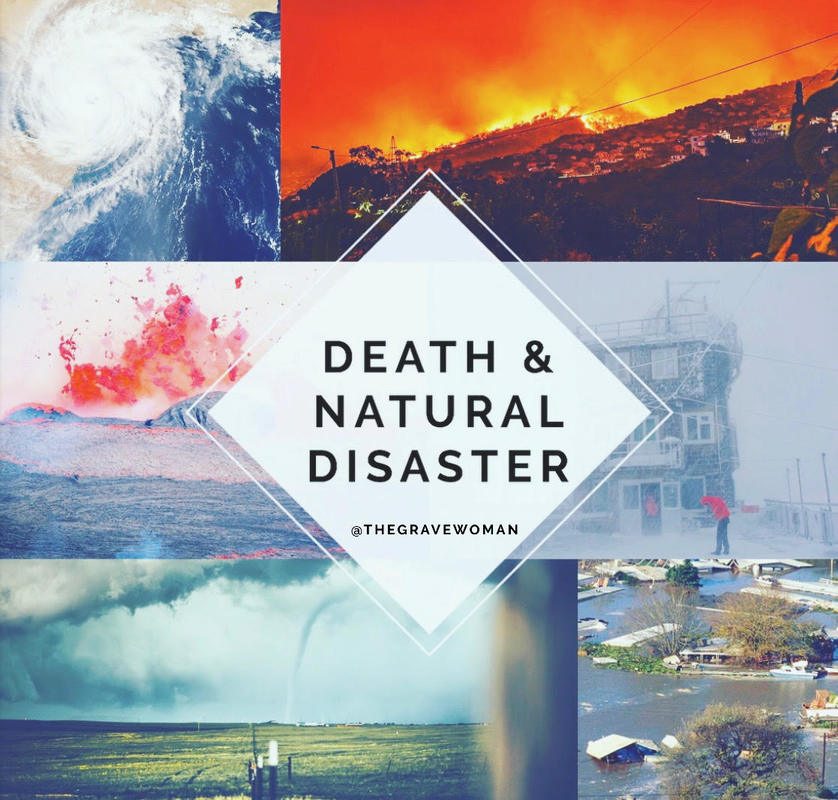|
Even if we are not personally affected, if we live in the United States we have all at least seen headlines or news coverage about the recent natural disasters that have torn through our country. According to Wikipedia natural disaster is defined as “any adverse event from natural processes of the earth. Examples include floods, hurricanes, tornadoes, volcanic eruptions, earthquakes, tsunamis, and other geologic processes”. Though we are familiar with the devastating effects that natural disasters can have on the living as we prepare for, seek shelter from and manage the aftermath of their fury not many are aware of nor have given much thought to the effects natural disasters have on the deceased or the establishments and practitioners that are responsible for them.
In this blog and video series, we are going to explore Death and Natural Disaster: 7 Major Impacts that Natural Disasters Have on Funeral Service and the Deceased. Before we get started it is vital that you understand the funeral service establishment and licensed funeral directors role. When a funeral home, crematory or cemetery takes custody of the remains of a deceased human being they are responsible for not only the care of the deceased as it relates to preparing them for funeralization and burial. They also take on the responsibility of ensuring the protection of the deceased and protecting society from any potential dangers that could be posed from coming in contact with the deceased should they exist while in their custody (this mortuary law lesson will be vital in just a moment I promise). Because of this, funeral service establishments are required to have protocols in place that allow them to proactively respond to situations of all sorts including natural disasters. Preparation, Evacuation, and Electricity Before we get started it is vital that you understand the funeral service establishment and licensed funeral directors role. When a funeral home, crematory, and its licensed staff takes custody of the remains of a deceased human being they are responsible for the care of the deceased until funeralization and disposition are complete. They also take on the responsibility of ensuring the protection of society from any potential dangers presented by coming in contact with the deceased while in their custody (this mortuary law lesson will be vital in just a moment I promise). Because of this, funeral service establishments are required to have protocols in place that allow them to proactively respond to situations of all sorts including natural disasters. There are several factors involved when given the opportunity to prepare for a natural disaster. The time of year (weather), geographical location, establishment size, and equipment available, number of employees, and proximity to others are a few of these factors. Depending on the severity of an expected impact; many funeral service establishments choose to make arrangements with establishments in neighboring less or unaffected areas. These establishments are required to be equipped with the proper storage and tools needed to protect not only the deceased from the elements but also protect the public from any bio or other hazards posed by coming in contact with un-embalmed deceased bodies. These establishments can include but may not be limited to hospitals, military bases, and other funeral homes. In events where preparation and evacuation are not permissible the most important line of defense is an establishment’s action plan and outlined the protocol for responding to a natural disaster. In any event, the funeral homes communication with the deceased next of kin or person responsible for making their arrangements is vital. It is imperative that the funeral director communicates openly and honestly. As you can imagine a natural disaster of any kind that affects the funeral home, crematory or cemetery can cause scheduled funeral services and burials to be delayed or canceled entirely until it is safe for the public and funeral service personnel to safely attend. In these events, the funeral home is not responsible for cost incurred by family, friends and loved ones due to having to change or cancel travel arrangements. Another major component of a funeral service establishment’s ability to properly and safely care for the deceased is their ability to keep their lights on. Surprisingly, it’s not because the funeral home staff does not wish to roam around in the dark but because having coolers operational is vital to properly storing the deceased and retarding advanced stages of decomposition (even in embalmed bodies). Electricity is also vital because without it electronic filing of death certificates, telephone systems, and necessary electronic files are not accessible. Most funeral homes are equipped with very powerful generators that will allow electronically operated and refrigeration units and embalming machines to remain functional should an outage occur. To Be Continued... Join us next week as we discuss the impact and effects of Wildfires and Volcanic Eruptions have on funeral homes and the deceased. Photo Credit: Unsplash Tornado: Nikolas Noonan Hurricane: NASA Wildfire: Michael Held Blizzard: Ivo Paul Van Vliet Volcano Erupting: Pierre-Yves Burgi Flood: Unknown
0 Comments
Leave a Reply. |
Details
AuthorJoél Simone Anthony, also known as ‘The Grave Woman,’ is a licensed funeral director and embalmer. She is dedicated to eliminating misconceptions about post-life preparation while stimulating an open, honest and straight forward discussion about death. You can submit your comments, questions and requests to [email protected] or by using our contact page. |
